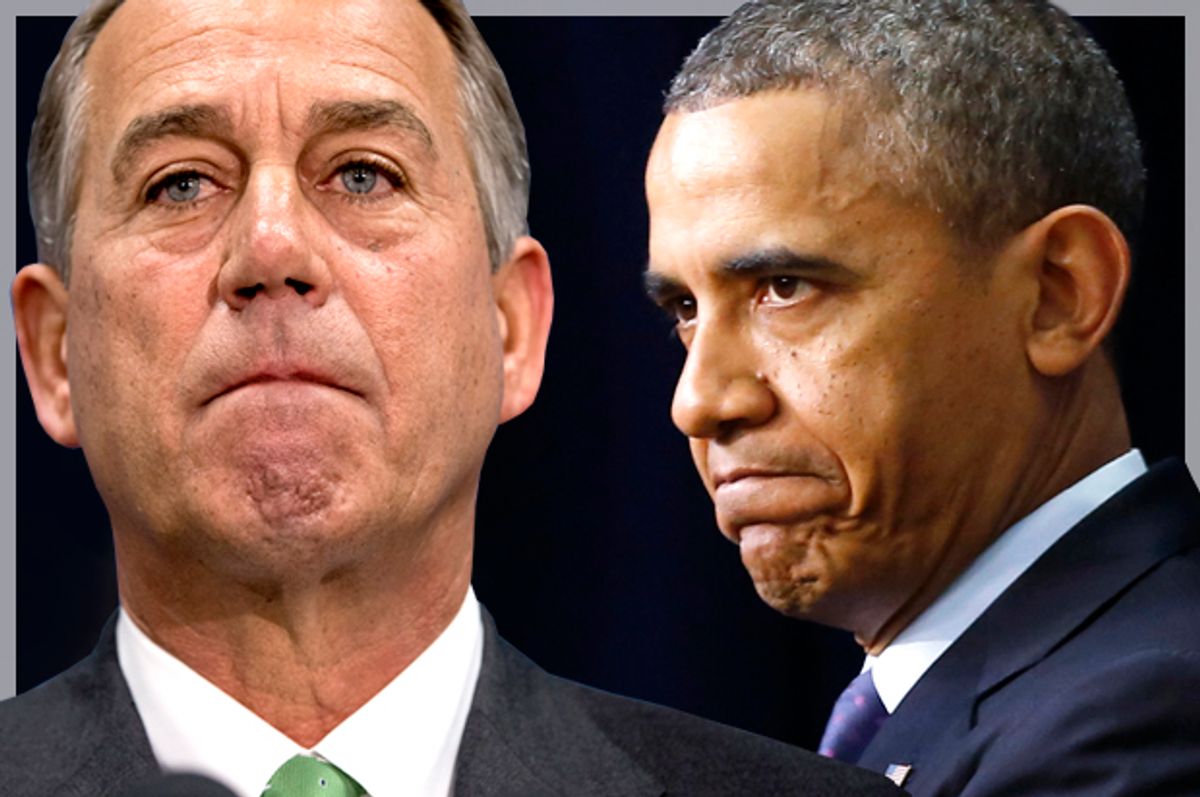Using his executive authority Monday and Tuesday, President Obama took two steps to combat dangerous forces that threaten the country.
Obama's order on Monday to escalate the war against the Islamic State -- and extend it to an al-Qaida affiliate the intelligence community has dubbed the Khorasan group -- has attracted far more attention. While Obama's notice to Congress of the escalation cited two congressional Authorizations to Use Military Force -- the 2001 Afghan AUMF and the 2002 Iraq AUMF, AUMFs so old that a majority in each house of Congress was not there to vote on them -- most experts deem that justification, particularly to cover Syrian bombing, dubious. Ultimately, the president is waging war on his own executive authority.
He's doing so, moreover, primarily focused against a threat that even he says does not pose an immediate threat to the U.S. In a speech two weeks ago, the president explained, "ISIL poses a threat to the people of Iraq and Syria, and the broader Middle East -- including American citizens, personnel and facilities." But only "if left unchecked," the president continued, would those "pose a growing threat beyond that region, including to the United States." Obama stated clearly that, "we have not yet detected specific plotting against our homeland" by ISIL.
While officials claim the Khorasan group -- which is a subgroup of an al-Qaida affiliate that the "moderates" we support in Syria work with -- was conducting "imminent attack plotting," at least some anonymous reports say they had not picked a target or method of attack.
The president, then, used his executive authority to escalate a war in a country and against people who may not pose a direct, imminent threat to the U.S.
And Congress didn't even blink.
Indeed, most of Congress -- including congressional
Congress -- parts of it, anyway -- is likely to be less supportive of the president's other executive order.
On Tuesday, Obama issued an executive order requiring "the integration of climate-resilience considerations into all United States international development work to the extent permitted by law." In addition to making climate one of a number of things that will be weighed in development plans, Obama committed to providing tools to poorer nations to help them become more resilient to climate impacts.
This means that the day after Obama escalated the actions of a military that consumes vast amounts of fossil fuel, he promised to consider climate in the comparatively minuscule impact the U.S. has via aid projects around the world.
And yet, as Obama listed in a Tuesday speech before the U.N. Climate Summit in New York, extreme climate is already hurting the U.S. "Along our Eastern Coast, the city of Miami now floods at high tide," he started his American tour of the widespread impacts of climate. "In our West, wildfire season now stretches most of the year. In our heartland, farms have been parched by the worst drought in generations, and drenched by the wettest spring in our history." The president ended with a reminder that Hurricane Sandy flooded New York City. "A hurricane left parts of this great city dark and underwater."
Obama made no mention, however, of the 117 deaths Hurricane Sandy caused, far more than any terror attack in the U.S. since 9/11.
While Mother Nature may not be making YouTube videos showing vicious beheadings of people, climate change is causing death and misery and extensive damage already. Even in the U.S.
It, like terrorism, is a force that both originates outside the country and festers within it. It, like terrorism, creates spectacular destruction and kills many in its wake. It, like terrorism, poses a real threat to the security of Americans.
And yet, Obama has not used his executive authority to protect this country against the ongoing impact of climate change with nearly the scope or audacity he has used to fight terrorists who threaten our access to more fossil fuel resources.
It would be far preferable and legally justifiable if Congress did its job to protect this country in cooperation with the president.
But if Congress has chosen to abdicate any role in the security of the nation, then Obama bears responsibility for his own choices about how to respond to the relative threats our country faces. And thus far, he has chosen to recklessly escalate on the other side of the world, while timidly responding to a more immediate threat here at home.
In his climate speech, the president rather ironically invoked Martin Luther King Jr.'s speech "Beyond Vietnam." In it, the civil rights leader described how we did then what we still do now in the Middle East: "[W]e increased our troop commitments in support of governments which were singularly corrupt, inept, and without popular support." The day after Obama escalated a war on the other side of the world, he cited King's radically anti-war speech to invoke the urgency of fighting climate change, not terrorism. "We are now faced with the fact, my friends, that tomorrow is today. We are confronted with the fierce urgency of now," the original speech went. "[T]here is such a thing as being too late," were the words the president cited.
And yet, having invoked that urgency, the president took executive action that -- compared with his executive actions that expanded a war -- was timid and inadequate to the climate threat facing the nation and the globe.
The president clearly believes he has expansive authorities to protect the country. Given that's the case, why isn't he heeding Dr. King's call to meet the urgency of the moment with appropriate action?

Shares